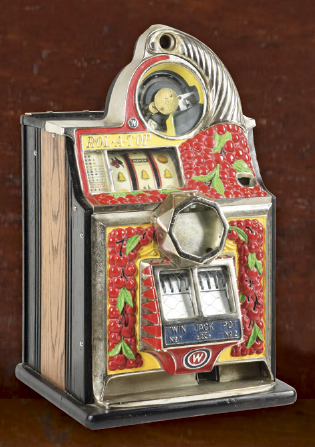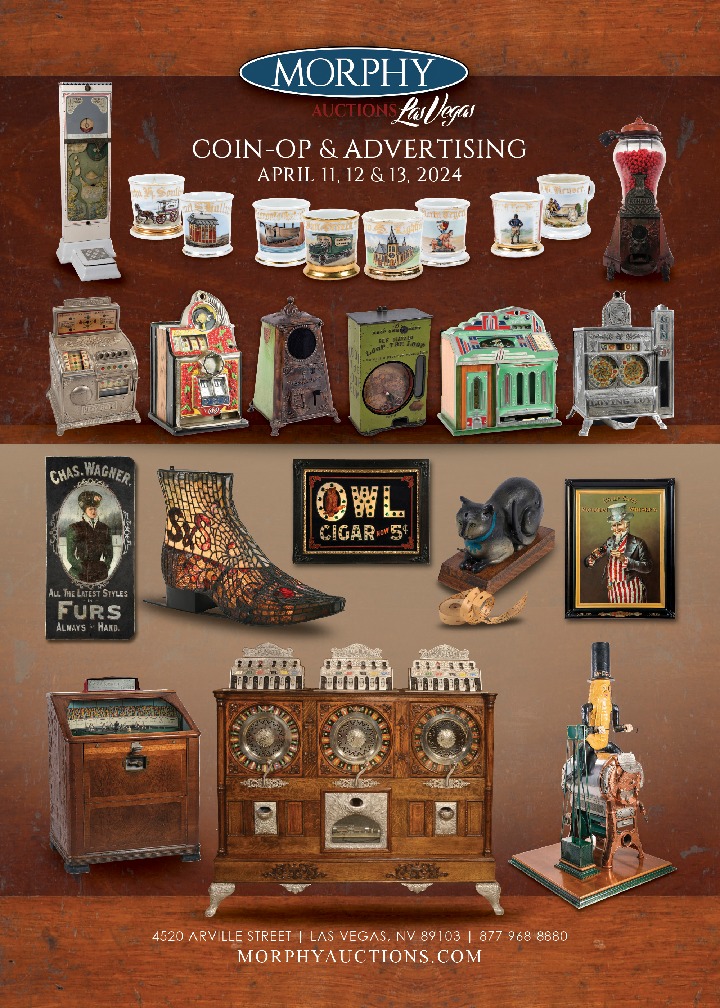Events
Home / Events

Morphy Auctions Las Vegas – Coin-Op & Advertising
Thu Apr 11, 2024 - Sat Apr 13, 2024
4520 Arville Sreet Las Vegas, NV 89103 -
Morphy Auctions Las Vegas – Coin-Op & Advertising
April 11, 12 & 13 2024
4520 Arville Sreet Las Vegas, NV 89103 | 877-968-8880
morphyauctions.com
LAS VEGAS — At the turn of the Twentieth Century, coin-operated machines could be found nearly everywhere, from arcades and boardwalks to hotel lobbies and bars. They stood ready to entertain, dispense a treat, tell a fortune or offer patrons a chance to win a jackpot, all for the cost of a penny, nickel or quarter. But it will take much more than pocket change to take home one of the treasures of that era offered in Morphy’s April 11-13 coin-op and antique advertising auction. The 1,919-lot sale will be conducted at Morphy’s Las Vegas gallery, with all forms of remote bidding also available, including live online through Morphy Live.
The diverse selection features gambling, vending, music and pinball machines, plus an array of antique advertising. Categories represented within the 1,225 lots of advertising signage and related items include tobacco, alcoholic beverages, snacks and gum; barber shop, general store, circus/carnival and many more.
The sale’s top-estimated lot figures prominently in Nevada’s long gambling tradition. It is a rare and highly sought-after Caille Bros Musical Triple Eclipse upright slot machine whose design incorporates three separate machines — accepting 5¢, 50¢ and 5¢, respectively — in an oak cabinet. An artistic masterpiece with its all-original castings and most of its original nickel plating, the unit was made sometime between 1902 and 1904. It is marked with Serial No. 121, confirming it is the earliest of only four extant examples of this particular model. Following its period of service as a gambling device, the machine became part of the Dobby Doc collection, which was amassed in the 1930s and 1940s and lay dormant until it was discovered in a Nevada warehouse in the late 1960s. In working order, the Caille Musical Triple Eclipse even retains its Yale locks and keys ($150/300,000).
A rare circa 1930 Fair-Weigh Golf Scale made by Colonial Golf Scale Co., is believed to be one of only three machines of its type still in existence. Its actions would have thrilled any would-be Bobby Jones or Byron Nelson of the prewar era. When a penny is inserted, the machine displays the patron’s weight and allows them to play a complex golf game by means of an internal golf club operated by a knob ($15/30,000).
All-American coin-operated baseball games have held their value well over the years. The auction includes one of the treasured productions made by Amusement Machine Co. sometime between 1929 and 1931. The 1¢ floor model is housed in a walnut case with a glass slant front and represents the 1927 World Series, which pitted the Pittsburgh Pirates against the ultimately victorious New York Yankees. The machine is unrestored, with original cast iron figures of the umpire and players and the original cardboard grandstand ($40/70,000).
Moving into the advertising category, a purr-fect choice is the rare circa-1952 black “Lu-Cat,” which combines a trade stimulator with a gumball-vending machine. Its action ensues when a nickel is inserted and the painted-aluminum feline’s tail is pulled. Fewer than a dozen “Lu-Cats” are believed to exist, and of those, the auction example is the only 5¢ version. One of the prizes of the Bill Howard collection, it is expected to sell for $10/20,000.
Get your red-hot peanuts from any of two dozen lots devoted to tasty goobers, like the Mr Peanut cast iron roaster/dispenser that was made as a point-of-sale display for Planters Peanut Co. By means of an electric motor, a top-hatted, three-dimensional Mr Peanut figure that straddles the transparent roaster renders the illusion that he is operating the machine. One of very few of its type known to exist, it stands 89 inches tall and is in restored condition ($30/60,000). Another “nutty” gem is the ornately decorative Kemaco “Lion” 1¢ peanut vending machine. Its unusual form features a “lantern” globe and a facade adorned with a bas-relief lion’s head. It stands 21 inches tall and is depicted in Bill Enes’ reference book Silent Salesman Too ($10/20,000).
The auction’s circa 1905 1¢ “See Diavolo Loop The Loop,” made by Mercer Manufacturing Co., is one of the most ingenious and desirable of all arcade vending machines. They seldom appear at auction. When a penny is inserted, a daredevil bicycle stuntman — patterned after an actual circus performer of the day — performs a full loop on his bike as a tab of gum is issued ($15/30,000).
Antique advertising signs are led by a three-dimensional stained and leaded glass trade sign for S&S Shoes (Schauder’s Shoe Store, Rhinelander, Wis.), a firm that was established in 1890. Measuring a sizable 41 by 25 by 12 inches, the sign illuminates if a light bulb is inserted ($40/80,000).
“Classic” is the word that comes to mind when describing the single-sided self-framed tin sign that promotes Schlitz “The Beer That Made Milwaukee Famous.” A pre-Prohibition advertisement made circa 1900s-10s, it depicts an ethereal woman opening a spigot to fill a bottle of Schlitz Beer ($5/10,000).
Morphy’s Las Vegas location is at 4520 Arville Street, #1. Start time on all three days is 9 am Pacific Time / noon Eastern Time. All forms of remote bidding will be available, including absentee, by phone or live via the internet through Morphy Live. For information, 877-968-8880 or www.morphyauctions.com.

Antiques and The Arts Weekly is the nation’s leading weekly publication on the antiques and the arts trade, and is available both in print and online.
Each issue average between 100-200 pages and includes reporting on auctions, antiques shows and the arts while providing a platform for both buying and selling.
We have been providing breaking news and important information on the world of antiques and the arts since Publisher R. Scudder Smith started Antiques and The Arts Weekly back in 1963.
Contact
LOCATED AT:
5 Church Hill Road / Newtown, CT 06470
HOURS:
Mon - Fri / 8:00 am - 5:01 pm
PHONE:
(203) 426-8036

